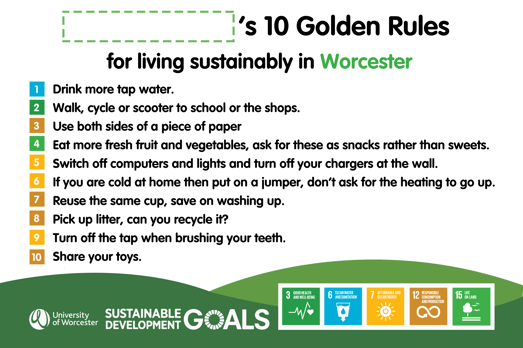
ENVIRONMENT


Environmental issues such as climate change, are a global issue impacting everyone. Whilst Severn Rising 2222 highlights the potential concerns around climate change, we also want to highlight how as individuals, we can make a difference.

The University of Worcester has created this great visual of 10 simple things we can all do.
Read on to learn how small changes we make in our lives, school and workplaces, here in Worcester can make a positive contribution to stemming the climate change crisis.




What can I do at home?

REPAIR
When something breaks see if it can be mended rather than throwing it away and replacing it.
The Repair Cafe in Worcester has been offering a repair service that doesn't cost the earth since 2016. Started by Transition Worcester and the Duckworth Worcestershire Trust as part of the international repair cafe community initiative, it now holds a regular event every second Saturday of the month to encourage repair. This supports Worcester’s response to the climate change challenge because repair lowers carbon emissions. Talented volunteer repairers are on hand to offer repair or advice for almost all your repair needs; electrical, pc, woodwork, sewing, gluing and fixing plus tool sharpening.
As part of the initiative there is a cafe offering yummy homemade cakes while you wait. The income from the café supports the buying of items needed for the repairs. Find out more about the repair café here.
RECYCLE
If an item cannot be repaired then make sure it is recycled and disposed of appropriately.
The national Recycle Now website also contains some useful recycling hints.
Local charity shops and re-use organisations offer a great way to recycle your unwanted items. Worcestershire County Council has a helpful list which also outlines the items each organisation will accept.
Severn Waste who oversees waste management in Worcestershire have some great guidance on their website about recycling.
GROW YOUR OWN
Worcester Community Garden are encouraging Worcester residents to grow our own produce. Even if you have a windowsill, you can grow edible delights such a herbs.
Their community garden initiative runs workshops and open events so we can all learn more about growing, pruning fruit trees and even bee keeping. They also have volunteer opportunities for people who want to get involved.
BUY LOCAL
Buy local grown and seasonal fruit and vegetables. Eating locally grown and in season produce reduces the carbon footprint our food as it requires less air miles. It also helps keep us more in touch with our local environment.
Try to reduce your beef in take and eat more plant-based food or even consider the new wave of insect-based food options!
BIO-DIVERSE OUTDOOR SPACE
Create a bio-diverse habitat in your garden and plant flowers to attract pollinators.
Can hedgehogs (a species in rapid decline) move freely into your garden? Ensure there are hedgehog tunnels or highways between gardens put out food they like to eat. The Worcestershire Wildlife Trust provides some great advice on how to care for hedgehogs and make your space hedgehog friendly.
REVIEW THE ENERGY EFFICIENCY OF YOUR HOME
Can your home be made more energy efficient? More energy efficient homes reduce your energy bills, reduce energy wastage and cute carbon emissions.
Smaller measures like improving the draft proofing and fitting loft insulation can be done relatively cheaply. Larger tasks like house insulation and solar panels may involve a larger investment but have a big impact.
Worcester City Council offers Green Home Advice and grants to help improve the energy efficiency of your home. Click here to find out more details.
Worcestershire County Council offer grants to help improve the energy efficiency of your home. Click here to find out more details.


What can I do at school?

Schools and their pupils are often incredibly tuned into ‘green’ concerns. But it’s worth reviewing if there is more you and your school could be doing. Make sure your school know that doing all we can to prevent climate change is important to you.
Walk or cycle to school. This reduces pollution than travelling by car and can help to keep you healthy and fit.
TRAVEL
Take your own refillable bottle to school rather than purchasing an item in single use plastic.
REFRESHMENTS
Join the school’s eco-council and help promote environmental changes in your school. If they don’t have an eco-council, ask them if you can start one!
If you school isn’t already signed up to the Eco-School framework then actively encourage them to join.
ECO-COUNCIL


What can I do in my workplace?

It’s easy to think we have little control in our workplace over their sustainability choices, but if as employees, we express concern and help highlight our concerns we can help influence change.
Think about how you get to work. Can you walk or cycle to work, rather than taking the car? Even switching to walking once a week can have an impact on your carbon footprint.
TRAVEL
Take your own refillable water bottle and reusable cup to work rather than purchasing an item in single use plastic.
REFRESHMENTS
Think before you print a document. Do you really need to print it out? Reduce paper waste by not printing out needlessly.
PAPER
Turn off devices when you aren’t at your desk and turn off lights in areas that aren’t being used.
SAVE ENERGY
Become familiar with your organisation’s sustainability policy and if it doesn’t have one yet, encourage them to create one. You could even get involved in writing it and raising awareness.
SUSTAINABILITY POLICY
Worcestershire County Council offers a Business Energy Efficiency Programme to help businesses carry out an energy efficiency assessment.
ENERGY-AUDIT
Is there a space at work in which you could create a wildlife habitat, maybe plant some wildflowers, put out bird feeders or create a small vegetable garden? As well as being beneficial for the environment this may improve employee well being too.
WILDLIFE HABITAT


Remember our individual actions really can have an impact on the environment! Let’s all act now to avoid the vision of Worcester portrayed in Sever Rising 2222, becoming a reality.




























